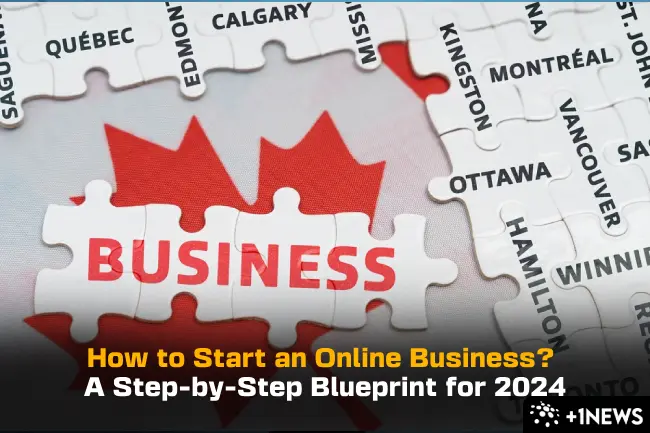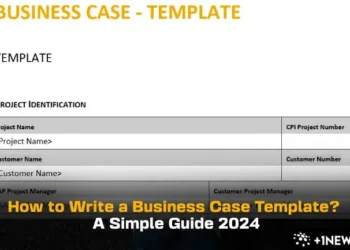Online business in Canada represents a great opportunity to target positive growth in the digital marketplace. With the right approach, one will be able to start a business to capture the essence of your passion and enable you to fill the growing services and products needed in the marketplace. But the question still remains: How to start an online business?
With the freedoms given in the digital age and the huge potential of an Internet marketplace, everybody dreams of starting a business. The appeal of an online business is not just its huge potential for growth, but also the ease with which one can get started with that very small amount of capital.
More than this, the apparent easy entry allied to the rapid expansion of e-commerce means online business now has strong appeal to the aspiring business owner.
How to Start an Online Business in 7 Steps
To start an online business, you should have a complete knowledge of its structure. Below are some of the easy steps for starting an online business.
1. Define Your Business Idea
a. Find Your Niche:
How to start an online business within the correct niche is important if you are going to make a success of it in the crowded market of Canada. The first thing is to figure out what the best products are to sell online in Canada, which solves a particular need or fills a gap. Look for trends that do well according to your interests and skills.
Example: If your attention is attracted by eco-friendly products, focus on a certain niche that deals with sustainable goods. Meanwhile, consider researching the top ten online businesses in Canada to indicate current consumer interests and less saturated markets.
b. Validate Your Idea
Ensures there is demand for your business before you put in work and spend your resources. It involves researching the market to understand the customers and their buying behavior. Acquire tools like surveys, Google Trends, and the Keyword Planner which may be useful in making an assessment of the interest in the offering that you have in mind.

Example: You may think about how to get the idea of starting an online business with no money and then decide to choose low-cost products because it matters much, especially those that would require no money upfront for offers, such as digital products or drop shipping. Idea validation is a way to save from expensive mistakes and to be better matched with market demand.
2. Plan Your Business Structure
a. Choosing a Business Model:
How to start an online business? There are several business models available for use when starting an online business. Each has its own pros and cons, considering your goals, resources, and flexibility preferences.
Common models for people starting an online business with no money include the dropshipping model, where you offer products for sale directly from the wholesaler or manufacturer. Hence, you are saved from forking out any charges or risks that may be involved in stock management.
The other one is affiliate marketing in which one is rewarded with commissions for selling other people’s products online. This is a good starting online business from home and one engages in minimal investments.
b. Legal Considerations:
The choice of structure in any online business is very vital. This affects liability, taxes, and how to raise money. Business structures are easy in Canada and protect your personal assets.
How to start an online business? Most online businesses begin as sole proprietorships or limited liability companies. A sole proprietorship is ideal for an individual who wishes to start an online business, especially a teenager who wishes to avoid as much bureaucracy and set up costs as possible.
But if you would want to scale or you would want to make a significant investment, then an LLC might be better because it provides respect and an additional layer of protection. Always consult with a legal expert to ensure the structure aligns with your business needs and local regulations. It is an essential step in learning how to start an online business.
3. Develop Your Online Identity
a. Domain and Hosting
A good domain makes for a memorable web address and your hosting service guarantees that your site is up and running. You will want a domain that can be spelled easily, pronounced clearly, and remembered well. Also, make it brandable or related to the products you will sell.
If you are targeting a Canadian audience, then think about using a .ca extension for the domain. Using domain names that incorporate keywords such as “start an online business” or “small business online” really adds to the searchability factor. But that hosting really needs to have very high reliability and be fast.
So what you will want to look for are hosting providers with a high uptime guarantee and great technical support who are also scalable. Well-known hosting providers are Bluehost, SiteGround, and Hostinger. These services host starting online businesses at no cost, offering cheap solutions to get you on the web.
b. Making Your Website
Making your website user-friendly is important for retaining your visitors and converting them into clients. Here are some vital points for making a website user-friendly:
- Responsive Website: Make sure that your website is compatible with different screen sizes of devices since most users will access the website through mobile and tablet devices.
- Fast loading time: A slow web page is a big turn-off for potential clients. Use tools such as Google PageSpeed Insights to measure and increase speed.
- Easy Navigation: Design menus with an intuitive and clear layout for easy findings and quick movement.
- SEO Basics: Use your primary and secondary keywords naturally throughout your site. Be descriptive in meta tags and alt text; further, keep URLs clean, short, and keyword-rich.
- Security: Make your site secure by using an SSL certificate. A COMPANY SECURITY holds a lot of people’s data, so you must be credible.
All these components will not only enhance user experience but also help you start an online business from home, whereby your site ranks well on all search engines.
4. Source or Create Your Product
a. Picking the best
How to start an online business? The source of business success is to discover or create products that enjoy good demand in the market. Here are some ways:
- Market Research: Use tools like Google Trends, Amazon Best Sellers, and social media to identify trending products. Look at the market gaps where you can provide a unique solution.
- Testimonials: Involve potential consumers with surveys and social media so that dialogues can be held regarding their needs and preferences.
- Competitor Analysis: Get to learn what your competitors are offering. It identifies what works positively or negatively for them in order to get where to plug in your niche for differentiation.
If you are not sure about what to sell online in Canada, you can start with small-unit goods or maybe digital products, which are generally of less risk. This is helpful even if you are looking to start an online business with no money.
b. Supplier Relations
Establishing a good relationship with the supplier helps immensely in the smooth running of such businesses. Here are some ways to do it:
- Research Suppliers: Find reputed suppliers either through listing directories such as Alibaba, SaleHoo, local trade shows, etc. Look at reviews and check good service.
- Everything is Negotiable: Speak about the minimum quantities that you are supposed to order for the best price or the terms of shipping. Try as much as possible to negotiate favorable terms, especially when starting an online business with no money.
- Drop Shipping Agreements: If you would rather not keep inventory, then you can look into dropshipping, whereby products are sold directly from suppliers to customers without physically handling the product. This is one of the best ways to start an online business on a budget.
5. Market your business
a. SEO and Content Marketing
Organic traffic to your website can be acquired by effectively using SEO and content marketing. How?

- Keyword Optimization: Use your primary keywords, like “how to start an online business,” and other semantically connected ones, such as “start a business online,” where they fit into your content naturally and offer some value.
- Quality Content: Write blog posts, guides and articles that solve your target audience’s pain points. For example, “10 of the Best Online Businesses in Canada” or “Small Business Ideas for Teens.”
- Backlinking: Build backlinks from good websites to increase your domain authority. This can be done through guest posts and collaborations with influencers in the industry.
b. Social Media Marketing
Social media is a huge platform for brand awareness and engagement with customers. Strategies:
- Platform Selection: Select those platforms that have your target audience. For instance, a person can use visually driven products over Instagram and Pinterest or use LinkedIn to offer their B2B services.
- Consistent Posting: Keep up the pace with regular posting and share various tips, product updates, and customer stories.
- Engagement: Reply to all the comments and messages promptly. Organize contests, polls, or go live to make it engaging.
c. Email Marketing
A powerful email marketing strategy can easily convert these subscribers into loyal customers. Here’s how:

- Build an Email List: Offer an incentive in the form of discounts or attract people to register by giving them free guides. Apply for registration forms on websites and social media.
- Segment Your Audience: You should segment your email list by interest, purchase history, and demographic. This definitely helps in customization and communication with relevance.
- Compelling Content: Send out regular newsletters filled with interesting and relevant content, exclusive offers, and updates. Personalize the email with the first name and tailor the content according to their preferences.
Through these, you will be able to market your online business perfectly well and have thousands of visitors who will turn into loyal customers. Be it a startup online business from home or to target one of the top 10 online businesses, a proper strong marketing plan ought to be the key to success.
6. Launch Operations
a. Payment Gateway Setup
Safe and effective payment gateways are most important for e-commerce. Customers should feel secure in sharing their payment information and the experience customers receive through several payment options can enhance their way of shopping.
- Payment Gateway Alternatives: There are a good number of payment gateways in the market, each with various features and advantages. Some commonly used ones are PayPal, Stripe and Square. These platforms are already recognizable by a larger base of sellers and hence can be integrated easily without much effort into most e-commerce websites. The utility of PayPal comes at its peak during the starting phase of an online business with no money because it involves less capital at the beginning. On the other side of the spectrum, Stripe offers more advanced features for scaling businesses, such as subscription billing and advanced reporting.
- Security Features: Ensure the data of your customers is secure. Look for gateways that offer PCI-DSS security features for solutions. PCI-DSS is an organization in the industry that provides standards to protect card information during and after the financial transaction. In order to protect valuable customers, one should go further and enhance security for the transaction with strong data encryption, tokenization, and fraud detection. You will not only protect your valued customers but also build trust and get credibility for your online business simultaneously.
- Use Multiple Payment Options: Different modes of payment will help the customer pay using his most preferred mode of payment. Besides the common credit and debit cards, wise to add Apple Pay and Google Wallet. For those who want to start a business with Amazon or in Amazon, Amazon Pay must be integrated, which will make the checkout process faster for Amazon users.
b. Order Fulfillment
Correct order fulfillment generates customer satisfaction and guarantees return customers to buy again. Below is the guideline in handling the order processing logistics:
- Inventory Management: It is very important to maintain an inventory record. Use inventory management software to track levels of stocks, keep an eye on orders and even control reordering. This therefore enables you to remember the right products that customers order or purchase from you whenever they need them, thus discounting stockouts and over-stocking.
- Shipping Options: Having more than one shipping option can suit the several needs of customers. The provision of standard, expedited and overnight shipping options enables customers to select the time they would wish to have their delivery made. For a business that has just started running online business while at home, it is going to be quite important to engage reputable courier services such as UPS, FedEx and DHL for delivery.
- Packaging and Handling: Proper packaging saves products in transition and adds to an improved unboxing experience. The effect of good, sturdy, and branded packaging will make a very great impression. Others who want to start an online business as a teenager or have small business ideas for teens, they might also consider eco-friendly packaging for the appeal it offers the green market.
- Returns Management: To drive customer trust, I would establish an easy way for returns with prepaid labels and prompt payment with regard to the refund or exchange. This policy will reduce negative experiences and lead to repeat business.
7. Optimize and Scale
a. Customer Feedback
Customer feedback is a great tool for product or service improvement. This is how to get the maximum from it:
- Obtaining Feedback: Use as many channels as possible to get feedback, such as surveys, email requests, and social media. For online businesses, keep an eye on social media and review sites for customer views.
- Analyzing Feedback: Analyze the received feedback for common trends and areas of weaknesses. Use sentiment analysis to determine customer satisfaction and pinpoint certain problems. This guides improvements in products and services.
- Implementing Changes: Based on the feedback, prioritize the actionable points and implement the changes first that will result in the biggest gain.
- Communicate changes to customers: It is important to let your customers know that changes have been made based on their valuable feedback to improve the user experience.
b. Scaling Up
That is a normal extension of scaling a business: growing your product line, reaching new markets and improving your marketing. Here are some:
- Expand Product Offering: Do so in response to market demand and customer feedback. For instance, if an online sale is in Canada, there should be a search for new items that are trending in Canada that can help expand sales in Canada.
- Enter New Markets: Think big and have a try at international sales. Investigate the regulation and new region’s preferences and be sure to make everything relevant to that market. If you are a business striving for an e-commerce presence in Canada, this might include localizing your website and marketing materials for Canadian consumer appeal.
- Marketing Strategy: Enhance your marketing efforts through SEO, social media and email marketing. Employ primary and secondary keywords like “how to start an online business,” “start a business online,” and “how to start an online business with no money” to get higher ranked among searches. Collaborate with influencers, run targeted ad campaigns, etc., around the premise that your visibility quotient needs to be very high.
- Automation Tools: Use automation tools available for improving some details. These details include email automation, inventory management systems, and customer relationship management software that can help handle the extra workload.
How to Start an Online Store
Starting an online store involves several steps: selecting a niche, choosing the right e-commerce platform, designing your store, and setting up payment gateways. It’s essential to plan thoroughly to ensure a smooth launch and successful operation.
How to Choose the Right E-commerce Platform?
Platform selection is the main point of setting up the success of any online store. There are several varieties of e-commerce markets, each with a unique type of platform. Not only is Shopify easy to use, but also abounds with a lot of features and customizable options.

It serves the needs both for novices and experienced entrepreneurs in the e-commerce world. Think about the scale, payment gateway integrations and type of product you will sell.
Design and User Experience: Main Elements in Building an Attractive E-store
Your store design is so important, as it is what can get clients to come or keep them away. Good design should not only look good but also be easy to navigate.
It has an uncluttered layout, ease of movement, super-fast loading speed and, of course, is very responsible to mobile.
High-quality images and described products ensure a better user experience, allowing the customer access to all the information they need to make an informed decision.
10 Best Online Business Ideas
How to start an online business? You might not believe it, but today’s digital world is full of opportunities for any entrepreneur with any kind of background. There are online businesses that interest businesswomen who would like to have businesses with little capital, niche businesses, and others.
Here are ten interesting online business ideas, what makes a model unique, and why it can be the right pick for the different entrepreneurial spirits.

1. Dropshipping
Dropshipping is one of the popular online businesses for most starting entrepreneurs, considering the fact that it is all about starting with almost no capital. This business model will allow one to partner with suppliers who will be taking care of the inventory and shipping so you can sell the products online without ever seeing or touching these goods.
This kind of model is perfect for people who want to take on as little risk and initial investment as possible, hence it is the perfect way to start for an entrepreneur learning how to start an online business from home.
2. Affiliate Marketing
Affiliate marketing is the act of publishing web links on someone else’s website or blog in order to attract potential customers or leads in exchange for generating a commission from potential sales. It is, therefore, a great opportunity to monetize traffic for bloggers and every other content creator.
If you have a big online following or are great in digital marketing, this model is going to turn your traffic into a consistent stream of income without trying to create products.
3. Selling Digital Products
Selling digital products is one of the Top 10 internet-based businesses and such services include selling eBooks, selling courses that one has taken towards skill development, digital art, and digital music.
Digital products are sold with high margins and low overheads because they do not require physical storage or shipping. For service or hobby domain experts, such people package their skills or creativity and sell it to a global audience.
4. E-Consultancy
If you are an expert in something, then online consulting is probably for you. It is quite easy to start online consulting in marketing, business strategy or technology. This model is very appropriate for professionals who want to leverage their skills into a flexible, potentially lucrative job online.
5. eCommerce Retail
A traditional model to sell on the internet is to open an online store. Modern platforms made it easier than ever for this way of selling, like Shopify. There are no excuses, from curated goods to handmade products. This is a great model for entrepreneurs who love retailing and want to reach a wider market than their geography.
6. Content Creation
If you are the kind of person who loves to tell stories or create content, blogs, vlogs on YouTube or podcasts might just be fulfilling as an online business. From monetizing with advertisements, sponsored content, and even donations from fans on some related platforms, content production turns from a passion to a full-on career.
7. Subscription Services
A subscription service can be built around this, where curated products or exclusive content is dished out to rake in ongoing revenues. And this model is, therefore, perfect for niches where you can always get the thrill of something new to be sent once a month, be it gourmet foods, books or even hobbies.
8. E-courses and Webinars
Online learning is in demand to an extent that almost seems to explode, providing a golden opportunity for educators and professionals. You can teach anything from basic programming and design to personal development and crafts using platforms like Teachable and Udemy for hosting and sale.

9. Software as a Service (SaaS)
The other alternative is the creation of an application that serves some businesses or individuals, charging on a subscription basis. SaaS businesses operate based on recurring revenues and scaly models, meaning that they are appropriate for tech-savvy entrepreneurs who can handle long-term projects.
10. Handicrafts and Handmade
Etsy has made it easier than ever for artisans to turn their dream of an online business into a reality. No matter if it’s jewelry, art, home decor or design in almost any medium, selling it online through limitless venues will connect you with the global market.
Each of these business models comes with its own set of pros and cons and it is better suited to a different type of entrepreneur. So, suppose you want to start selling online with little to no money upfront, are searching for small business ideas for teens or are looking to establish a fully functional online venture. In that case, the digital opportunity is eminently ripening. Proper business model selection will depend on your capabilities and market demand in Canada and others to lay a foundation for a sustainable and successful online business.
Conclusion
How to start an online business? This takes a lot of planning, strategic execution and constant optimization. Secure payment gateways, efficient order fulfillment, leveraging customer reviews, and scaling help in building a successful and sustainable online business.
So, start your first step toward entrepreneurship today. Get inspired by these strategies and tips to launch yourself into the journey of opening an online business and see how you can flourish in the digital marketplace.
Frequently Asked Questions
Do I need a business license to operate an online business?
Yes, most online businesses do require some form of licensing or permit, but this will differ by jurisdiction and business activity.
What’s the best place to create an online store?
Among them are Shopify, WooCommerce, and BigCommerce, which are very popular because of their ease of application, scalability, and inclusiveness in features.
How can I get products for sale from the internet?
You may source the product from wholesalers, drop shipping suppliers, or indeed make your own product to sell online.
How am I going to market my business online?
Implement digital marketing techniques like search engine optimization, social media marketing, email marketing, and content marketing to attract and retain customers.
How can I handle shipping the right way for my online business?
Look into third-party fulfillment or set up direct handling with USPS, FedEx, UPS, and others.
How to accept online payments?
Payment gateways: PayPal, Stripe, and Square. That allows you to accept payment through credit cards and other forms online securely.
Can you tell when does it take to have a new online business?
You can set up a basic online store in a couple of days, but planning and building a customer base and also developing products, for the most part, will probably take a couple of months.
What is the major challenge being faced in online entrepreneurship?
Some common challenges are related to finding a profitable niche, consistent traffic and the big established brands that you’re going to have to compete with.
What is the first step on how to start an online business?
Start by defining a niche market and thereafter, develop a business plan indicating how you will satisfy your customers and the market at large.














